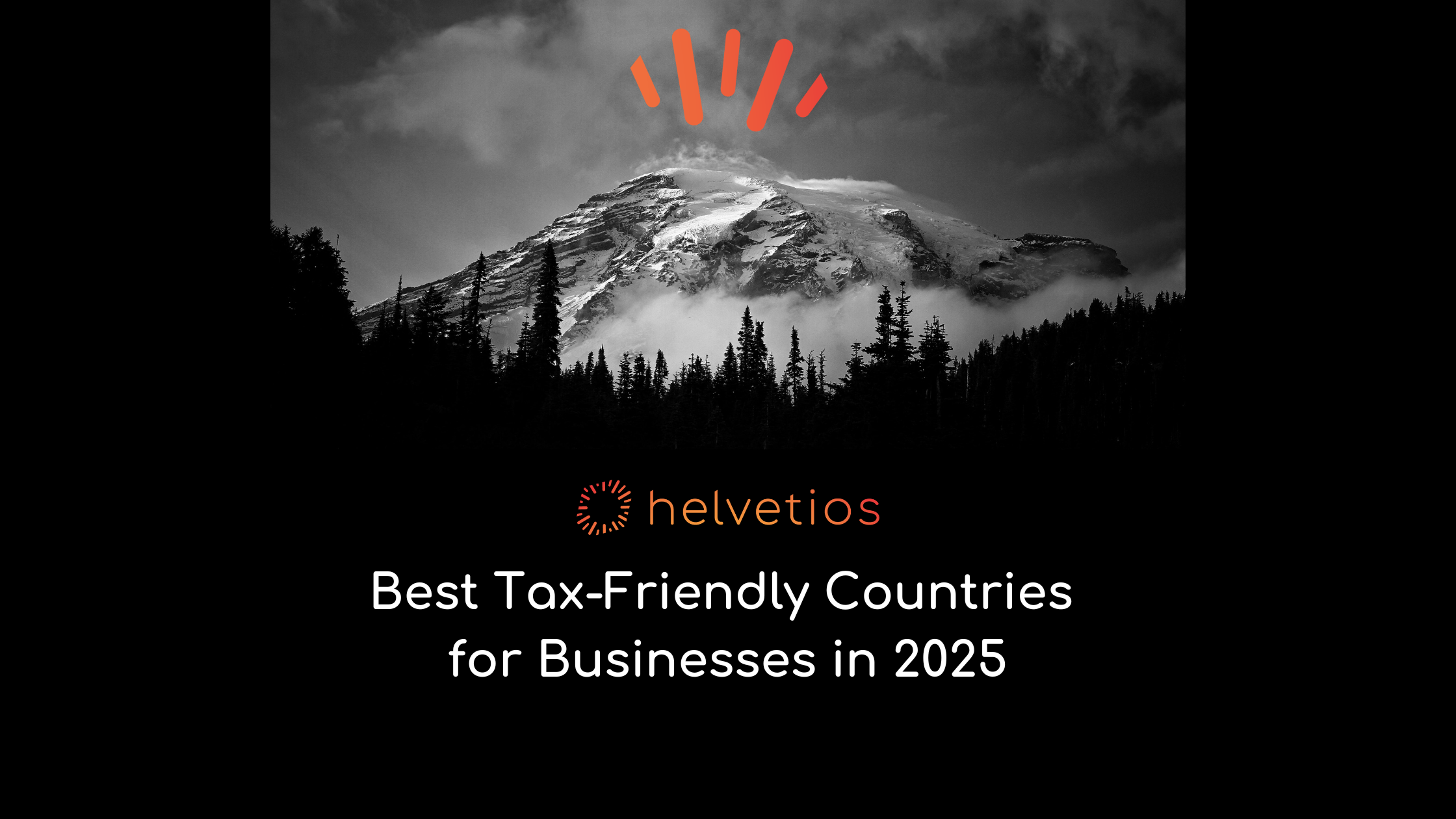An expert guide by Helvetios.eu
In today’s fast-evolving business landscape, structuring your company across borders is not just about going global—it’s about doing so smartly. For entrepreneurs, startups, and established businesses alike, optimizing your tax position through strategic international setup is a powerful tool for reinvestment and growth.
At Helvetios, we work hands-on with international clients to select and establish operations in jurisdictions that align with their long-term goals. But the tax landscape is changing fast. With OECD initiatives like BEPS and growing international transparency, simply setting up a shell company in a “tax haven” no longer works. The OECD has estimated that lost revenue from profit shifting could range from US$100–240 billion annually, equivalent to 4–10% of global corporate income tax revenue, with developing economies suffering disproportionately.
Here’s what you need to know about low-tax jurisdictions in 2025, where to look, and how to build a legal and sustainable international structure.
Low Tax Is Not No Tax: What Has Changed in 2025
Many low-tax countries still offer legal ways to reduce corporate income tax. But to benefit from these regimes, your business must demonstrate real economic substance:
- Local employees and directors
- Physical office space
- Core income-generating activities taking place on-site
- Local business management and control
Tax authorities globally now require proof that your business operates in the jurisdiction it claims to be registered in. Failure to meet substance requirements can lead to tax penalties, double taxation, reputational damage, and even loss of banking access.
More Than Just a Number: Key Factors Beyond the Tax Rate
While a low corporate income tax rate is attractive, selecting a jurisdiction based solely on this figure would be a mistake. Here are other vital factors to weigh:
- Political and Economic Stability: A stable environment is crucial for long-term business operations.
- Ease of Doing Business: Consider the simplicity and speed of company registration, regulatory compliance, and administrative burdens.
- Legal and Regulatory Environment: A robust, predictable, and business-friendly legal system is paramount.
- Banking Infrastructure: Easy access to reliable banking services is essential.
- Availability of Skilled Workforce: If substance requires hiring locally, is the talent pool available?
- Tax Treaty Network: A jurisdiction’s network of double taxation treaties can significantly impact withholding taxes on international payments (like dividends, interest, royalties) and help avoid being taxed twice.
- Reputation and Compliance: Operating in a jurisdiction perceived negatively can impact your business’s reputation and banking relationships. Ensuring compliance with international standards is key.
- Specific Business Incentives: Some jurisdictions offer tax breaks or grants for specific industries (e.g., technology, research and development, holding companies).
- Compliance Costs: While tax rates might be low, the cost of complying with local regulations and accounting requirements can vary.
Top Jurisdictions for Tax-Efficient Business in 2025
Estonia
- Tax System: 0% on retained earnings; 20% only on distributed profits (rising to 22% from January 2025, and 24% from January 2026).
- Best for: Tech and digital-first companies reinvesting profits
- Requirements: While physical presence (office) is encouraged, a local director is not strictly mandatory (nominee directors may suffice).
Check out our latest article about benefits of Estonia E-Residency.
Cyprus
- Corporate Tax: The standard rate remains 12.5% for most companies. The 15% rate applies only to large multinationals (revenue >€750M) under OECD Pillar Two (Global Minimum Tax).
- Dividends: The Deemed Dividend Distribution (DDD) was abolished in 2022. The Special Defense Contribution (SDC) on dividends remains 17% for residents; no reduction to 5% has been announced.
- Best for: Holding structures, EU-based firms
- Requirements: Enhanced substance enforcement in 2025
Malta
- Headline Rate: 35% nominal, with refunds reducing it to 5–10%
- Best for: Holding, finance, IP-heavy businesses
- Strengths: Strong legal system, EU compliance
United Arab Emirates (UAE)
- Corporate Tax: 9% for profits over AED 375,000 (~$102,000)
- Free Zones: 0% for qualifying income with substance
- Global Minimum Tax: 15% top-up tax applies to multinationals
- Best for: Logistics, regional headquarters, digital trade
Hong Kong
- Corporate Tax: 16.5%; territorial system (foreign-sourced income usually exempt)
- Best for: Trading and consulting businesses in Asia
- Advantages: No VAT, strong banking sector
Singapore
- Corporate Tax: 17%, with partial exemptions
- Incentives: Tax rebates, R&D credits, no dividend tax
- Best for: Regional HQs, fintech, and SaaS companies
Ireland
- Corporate Tax: The 12.5% rate remains for SMEs. Large MNEs (revenue >€750M) face a 15% rate under Pillar Two (effective 2024). The 6.25% rate for IP under the Knowledge Development Box (KDB).
- Strengths: English-speaking, EU access, extensive DTA network
- Best for: Software, pharma, IP-holding firms
Need help navigating the setup?
At Helvetios, we specialize in guiding entrepreneurs, founders, and businesses through the process of registering companies in the world’s top tax-efficient jurisdictions.Whether you’re drawn to Estonia’s digital ecosystem, Malta’s refund-based tax structure, or the UAE’s free zone benefits, our team can handle the heavy lifting — from documentation and local compliance to banking setup and ongoing support.
No matter which jurisdiction you choose, we’re here to make the process smooth, fast, and fully compliant.
Real Substance, Real Strategy
Low-tax jurisdictions today demand more than a registered address. You need:
- A real office presence
- Local employees or contractors
- On-the-ground directors
- Proof of business activity
Helvetios specializes in helping businesses meet these requirements legally and efficiently.
How Helvetios Helps You Navigate the Tax Map
Choosing the right jurisdiction and ensuring ongoing compliance is complex. This is precisely where Helvetios provides indispensable value. We don’t just help you register a company; we help you build a solid, compliant foundation for your international business.
Our services include:
- Jurisdiction Consulting: We analyse your business model, goals, and operational footprint to help you identify potential jurisdictions that are not only tax-efficient but also legally compliant and suitable for your specific needs in 2025 and beyond.
- Company Formation: We manage the entire process of incorporating your company in the chosen jurisdiction, ensuring all legal requirements are met.
- Ensuring Economic Substance: We advise on and help implement the necessary steps to establish genuine economic substance in your chosen location, whether it’s through office solutions, recruitment assistance, or structuring local management.
- Comprehensive Accounting Services: Once your company is established, our expert accountants handle your bookkeeping, financial reporting, and compliance with local accounting standards and tax regulations, crucial for maintaining substance and meeting filing obligations.
- Tax Compliance and Advisory: We keep you updated on relevant tax laws, help you understand your obligations, and ensure timely and accurate tax filings in your chosen jurisdiction and potentially other relevant countries.
- Ongoing Administration: We provide continuous support for administrative tasks, ensuring your company remains in good standing.
Start Your Global Expansion with Confidence
Exploring low-tax jurisdictions in 2025 can be the smartest move your business makes—but only if done right.
With Helvetios as your partner, you get more than a registered company: you get a strategy, a structure, and long-term support.
Book your free consultation today and discover how we can help you legally optimize your international business footprint.
Low-Tax Jurisdictions & International Tax Optimization FAQs 2025
What has changed in the international tax landscape in 2025?
The tax landscape has evolved significantly due to OECD initiatives like BEPS (Base Erosion and Profit Shifting) and increased international transparency requirements. Simply setting up shell companies in “tax havens” no longer works. The OECD estimates that profit shifting causes revenue losses of US$100–240 billion annually (4–10% of global corporate income tax revenue), leading to stricter substance requirements worldwide.
What does “economic substance” mean in 2025?
Economic substance requires businesses to demonstrate real operations in the jurisdiction where they claim tax residence. This includes:
- Local employees and directors
- Physical office space
- Core income-generating activities taking place on-site
- Local business management and control
- Proof of actual business activity
Why can’t I just set up a simple offshore company anymore?
Tax authorities globally now require proof that your business genuinely operates in the jurisdiction where it’s registered. Failure to meet substance requirements can lead to tax penalties, double taxation, reputational damage, and loss of banking access.
What factors should I consider beyond just the tax rate?
Key factors include:
- Political and Economic Stability: For long-term business security
- Ease of Doing Business: Registration simplicity and regulatory compliance
- Legal Environment: Robust, predictable business-friendly legal system
- Banking Infrastructure: Access to reliable banking services
- Skilled Workforce: Availability of local talent for substance requirements
- Tax Treaty Network: Double taxation treaties affecting international payments
- Reputation: Jurisdiction’s standing affects business relationships and banking
- Business Incentives: Industry-specific tax breaks or grants
- Compliance Costs: Local regulatory and accounting requirements
How do I determine which jurisdiction is right for my business?
Consider your business model, operational footprint, industry, target markets, and long-term goals. Professional consultation is recommended to analyze these factors comprehensively and ensure compliance with evolving international standards.
What are the benefits of Estonia for businesses?
- Tax System: 0% on retained earnings; 20% only on distributed profits (rising to 22% in January 2025, 24% in January 2026)
- Best for: Tech and digital-first companies reinvesting profits
- Requirements: Physical presence encouraged; local director not strictly mandatory (nominee directors may suffice)
- Additional Benefits: Advanced digital infrastructure and e-Residency program
Why is Cyprus attractive for businesses?
- Corporate Tax: 12.5% standard rate (15% for large multinationals with revenue >€750M under OECD Pillar Two)
- Dividends: Deemed Dividend Distribution (DDD) abolished in 2022; Special Defense Contribution (SDC) remains 17% for residents
- Best for: Holding structures, EU-based firms
- Note: Enhanced substance enforcement in 2025
What makes Malta appealing despite its 35% headline rate?
- Effective Rate: 35% nominal with refunds reducing it to 5–10%
- Best for: Holding, finance, IP-heavy businesses
- Strengths: Strong legal system, EU compliance
- Structure: Unique refund system for qualifying companies
What are the UAE’s current tax advantages?
- Corporate Tax: 9% for profits over AED 375,000 (~$102,000)
- Free Zones: 0% for qualifying income with proper substance
- Global Minimum Tax: 15% top-up applies to multinationals
- Best for: Logistics, regional headquarters, digital trade
- Benefits: Strategic location, no personal income tax
Why consider Hong Kong for Asian operations?
- Corporate Tax: 16.5% with territorial system (foreign-sourced income usually exempt)
- Best for: Trading and consulting businesses in Asia
- Advantages: No VAT, strong banking sector, established financial hub
- Considerations: Increasing compliance requirements and political considerations
What makes Singapore competitive?
- Corporate Tax: 17% with partial exemptions for new companies
- Incentives: Tax rebates, R&D credits, no dividend tax
- Best for: Regional headquarters, fintech, SaaS companies
- Strengths: Political stability, skilled workforce, strategic location
How does Ireland’s tax system work in 2025?
- Corporate Tax: 12.5% for SMEs; 15% for large MNEs (revenue >€750M) under Pillar Two
- IP Benefits: 6.25% rate under Knowledge Development Box (KDB)
- Strengths: English-speaking, EU access, extensive double taxation agreement network
- Best for: Software, pharmaceutical, IP-holding firms
What constitutes “real substance” in today’s environment?
Real substance requires:
- Physical office presence (not just a registered address)
- Local employees or contractors performing core functions
- On-the-ground directors with decision-making authority
- Documented proof of business activities and local management
- Regular board meetings and business operations in the jurisdiction
What happens if I don’t meet substance requirements?
Consequences can include:
- Tax penalties and reassessment
- Double taxation (losing tax benefits)
- Reputational damage
- Loss of banking relationships
- Regulatory scrutiny and enforcement actions
How can I ensure ongoing compliance?
- Maintain proper documentation of local activities
- Keep records of board meetings and business decisions
- Ensure local employees perform genuine functions
- File required reports and tax returns on time
- Work with local professionals for ongoing compliance support
Why should I use professional services like Helvetios?
International tax planning is complex and constantly evolving. Professional services provide:
- Jurisdiction Analysis: Matching your business needs with optimal locations
- Compliance Assurance: Meeting all legal and substance requirements
- Ongoing Support: Continuous administration and regulatory updates
- Risk Mitigation: Avoiding costly mistakes and penalties
- Banking Assistance: Helping navigate international banking requirements
What services does Helvetios provide?
- Jurisdiction Consulting: Business analysis and location recommendation
- Company Formation: Complete incorporation process management
- Economic Substance: Implementation of genuine business operations
- Accounting Services: Bookkeeping, reporting, and compliance
- Tax Advisory: Ongoing compliance and optimization strategies
- Administration: Continuous support for good standing maintenance
Can I set up international structures remotely?
Yes, many jurisdictions allow remote setup with proper professional assistance. However, ongoing substance requirements typically require local presence, which can be facilitated through professional service providers and nominee arrangements where legally permitted.
What are the typical costs involved?
Costs vary significantly by jurisdiction and include:
- Government registration fees
- Professional service fees
- Office rental or virtual office costs
- Local director/employee costs
- Ongoing compliance and accounting fees
- Banking setup and maintenance fees
How long does it take to establish an international structure?
Timeline varies by jurisdiction:
- Simple setups: 1-4 weeks for basic company formation
- Complex structures: 2-6 months including substance establishment
- Banking: Additional 2-8 weeks depending on jurisdiction and bank requirements
- Full operations: 3-12 months for complete setup with substance
What ongoing obligations will I have?
- Annual tax filings and compliance reports
- Maintaining economic substance requirements
- Regular board meetings and documentation
- Local accounting and bookkeeping
- Banking compliance and reporting
- Regulatory updates and adaptations
What are the main risks of international tax planning?
- Regulatory Changes: Tax laws and requirements evolve rapidly
- Substance Failures: Not meeting operational requirements
- Banking Challenges: Increasing due diligence and compliance costs
- Reputational Issues: Operating in poorly perceived jurisdictions
- Double Taxation: Losing benefits due to non-compliance
How do I stay compliant with changing regulations?
- Work with experienced professional advisors
- Maintain genuine business operations and documentation
- Stay informed about regulatory changes
- Regularly review and update structures
- Ensure proper reporting in all relevant jurisdictions
What should I avoid in international tax planning?
- Purely artificial arrangements without business substance
- Ignoring local compliance requirements
- Focusing solely on tax rates without considering other factors
- Inadequate documentation and record-keeping
- Working with unqualified or inexperienced advisors
How do I begin the process of international expansion?
- Business Analysis: Evaluate your current structure and goals
- Jurisdiction Research: Identify suitable locations based on your needs
- Professional Consultation: Engage qualified advisors for guidance
- Structure Planning: Design compliant and efficient arrangements
- Implementation: Execute setup with proper substance establishment
- Ongoing Management: Maintain compliance and optimize operations
What information do I need to provide for consultation?
- Current business structure and operations
- Revenue sources and profit margins
- Target markets and expansion plans
- Existing tax obligations and structures
- Risk tolerance and compliance preferences
- Long-term business objectives and growth strategy









